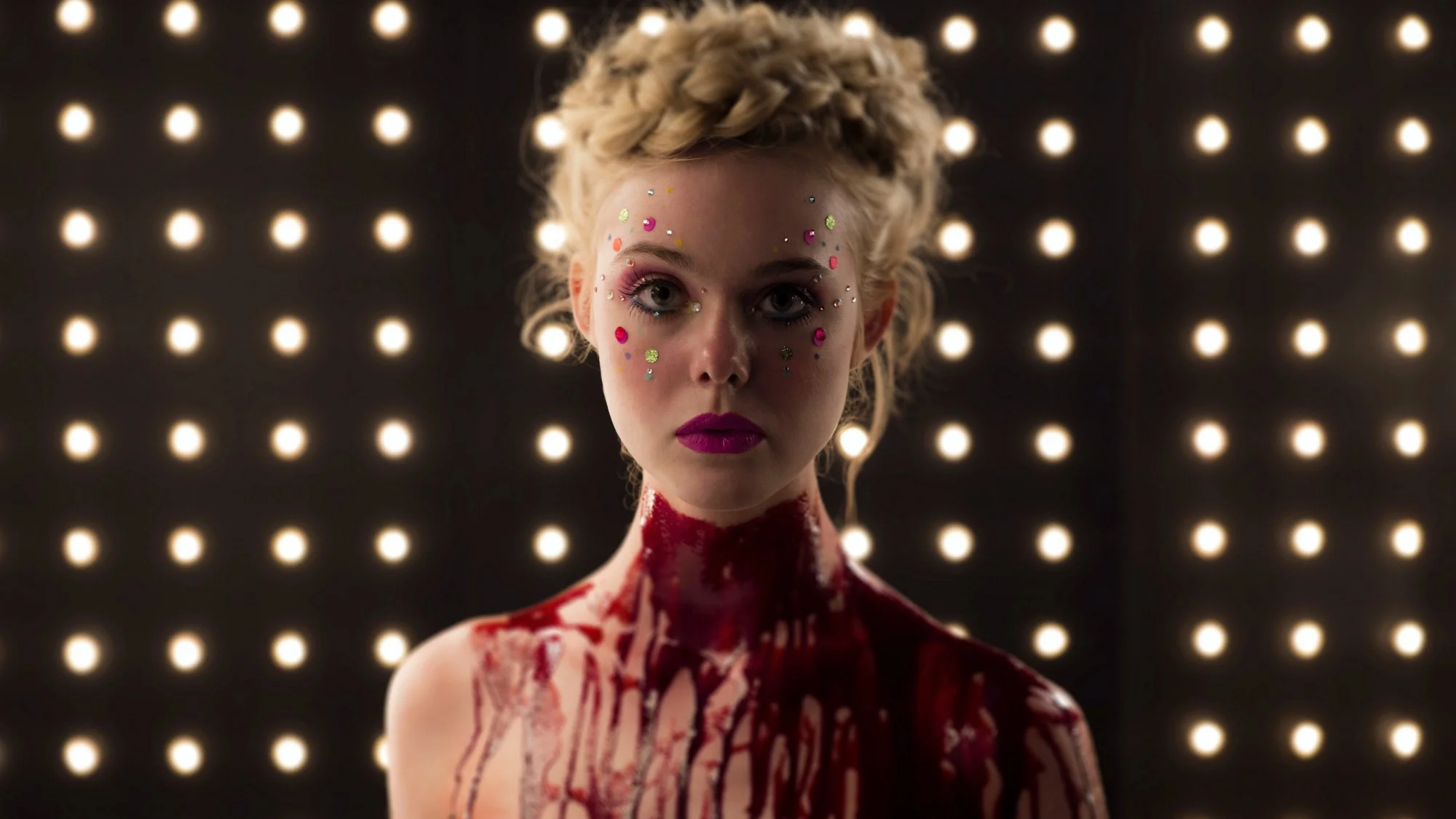the neon demon (2016)
Mysticism may win for least likely trend to suddenly overtake the populace in the early 21st century, but in an age where empiricism should have only exponentially increased, it hasn't, and we're still coming to terms with why. Could it be that the inner-workings of the technology that runs our lives remains a mystery to the masses at large? Could it be that the individual's inner impulses are increasingly crafted by consensus-shaping adverts? Yes, all around the modern individual, there seem to be unseen forces at work affecting their daily lives, guardian angels and demons of metal and microchips or, as I found out earlier today, neon. That the individual is living in a state of constant mental implants of desire, followed by subsequent (and increasingly instant) gratifications to them is as poignant an observation as it is admirable to attempt to distill it cinematically. To dive into the inner-workings of one such hub of desire/gratification manufacturing as the fashion industry, a place where one can achieve runway-induced nirvana that Elle Fanning describes so nonchalantly as "everything", is an equally coherent notion. For Nicolas Winding Refn, however, creating such a disgusting and tormenting nirvana for the viewer, while trying to find the time to preach the word, proves to be biting off more than he can chew. He instead decides to swallow some bits whole and, as you'll find out, this leads to a lot of unhappiness and upset stomachs.
Industries go through life cycles, just as the individuals who populate them do. In a hard-edged, bottom-line, cash-and-power-by-any-means-necessary business, it's a wolf race. In an industry that attracts a lot of starry-eyed dreamers (the younger, the better) there lurks a certain breed of wolf. A wolf, who probably began as a starry-eyed lamb and now every fabric of their being is dedicated to displaying what their industry has taught them, their every move simultaneously a demonstration of how much and how often they've drank from the common cup, and a dire warning to their inferiors to learn their lessons well. Anyone who hasn't learned the lessons must not be very powerful (and hence irrelevant) and so one need only look for the earmarks of the initiated to discern the quality of work. It's a beastly game of ferocity and beauty, the carnal, sex and violence (or as it's put early in the film 'sex and food'), the world unhinged, the human animal at play in the jungle of ornate construction, design at its most intricate. Refn portrays humans like Black Widow spiders, deadly creatures able to spin webs of gorgeous construction. The Neon Demon joins the ranks of post-Salo films that try to capture the essence of what Salo had to say about society, although the movement begins and ends with Pasolini, sadly, and the subsequent entries serve as reminders. The Neon Demon is also the least spectacular of Refn's past three films which seem to form into an odd trilogy about varying 'underworlds', lone characters adrift within them and an increasing love affair with saturated color. This is about as far as the observations wander, however, as we're introduced to all forms of aesthetic ecstasy. From wild cats in seedy motel rooms, to sequences entirely in the mind of Elle Fanning as she approaches the apex of her own life. The Neon Demon is about youth, though a kind of facsimile of youth induced through popular imagery of the world it lambastes (with sincere fascination). Yes, each locale from two young model-types on the hood of a car overlooking LA at sunset to the neon world of our heroine, seem ripped out of Vogue (The mere fact that I'm referring to the brand name of a magazine as simple 'Vogue' and not 'Vogue Magazine' should tell you that the word has now changed meaning in colloquial speech, we're more familiar with the product than we are with the actual meaning of its title, or maybe that's just me). To be uncontrollably in love, Refn posits, with the human body on its own, irrelevant of the mind or spirit, is a form of necrophilia. Like most in his hodgepodge, the idea is lucid and has solid ground to stand on, but the idea can barely be communicated by mere indulgence. As with the rest of the film, vibrant ideas come out flat and bland, titillating notions and sparks, no matter how exciting, can't convey their own sense of themselves in the end product. For all of its wild ideas and imagery, the film can't seem to communicate anything other than the bored and the beautiful, the world as it is in obsession with glamour and its empty, unfulfilling reality. Like a model, beautiful, but sickly skinny, starving herself to attain something she may have forgotten her reasons for wanting in the first place. As this is Refn's aim undoubtedly, he succeeds, but his film falls victim to its own beauty.
There are sequences contained therein that, were they part of a more effective tapestry, could be taken as flashes of genius. The Neon Demon may be best consumed in bite sized chunks as short fashion videos, its sequences that are dialogue-free are its strongest, the splashes of color, relying on the possible intentions contained within looks from sultry models. As with the material it draws from, the characters lose the element of interest as soon as they open their mouths, when left to stare, pout and look desperate, however, we're completely drawn in. Is there anything more unfortunate than a grand and memorable final scene without the film to lead up to it and bring us there in an intriguing way. No matter, Refn and his work aren't going anywhere and Neon Demon may stand a re-evaluation somewhere down the road. Here, in 2016, though, I can't say I was deeply engaged, more mildly aloof. I have to give the film credit where it's due, but it just doesn't hold water.
7

